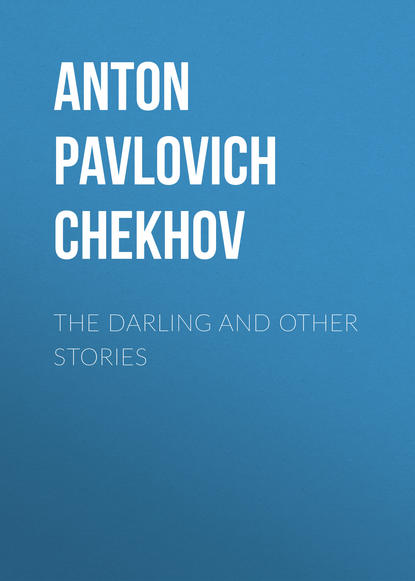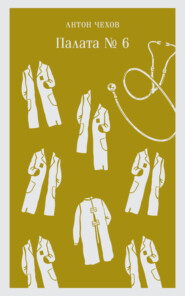По всем вопросам обращайтесь на: info@litportal.ru
(©) 2003-2024.
✖
The Darling and Other Stories
Настройки чтения
Размер шрифта
Высота строк
Поля
But behold! one winter day after drinking hot tea in the office, Vassily Andreitch went out into the yard without his cap on to see about sending off some timber, caught cold and was taken ill. He had the best doctors, but he grew worse and died after four months' illness. And Olenka was a widow once more.
"I've nobody, now you've left me, my darling," she sobbed, after her husband's funeral. "How can I live without you, in wretchedness and misery! Pity me, good people, all alone in the world!"
She went about dressed in black with long "weepers," and gave up wearing hat and gloves for good. She hardly ever went out, except to church, or to her husband's grave, and led the life of a nun. It was not till six months later that she took off the weepers and opened the shutters of the windows. She was sometimes seen in the mornings, going with her cook to market for provisions, but what went on in her house and how she lived now could only be surmised. People guessed, from seeing her drinking tea in her garden with the veterinary surgeon, who read the newspaper aloud to her, and from the fact that, meeting a lady she knew at the post-office, she said to her:
"There is no proper veterinary inspection in our town, and that's the cause of all sorts of epidemics. One is always hearing of people's getting infection from the milk supply, or catching diseases from horses and cows. The health of domestic animals ought to be as well cared for as the health of human beings."
She repeated the veterinary surgeon's words, and was of the same opinion as he about everything. It was evident that she could not live a year without some attachment, and had found new happiness in the lodge. In any one else this would have been censured, but no one could think ill of Olenka; everything she did was so natural. Neither she nor the veterinary surgeon said anything to other people of the change in their relations, and tried, indeed, to conceal it, but without success, for Olenka could not keep a secret. When he had visitors, men serving in his regiment, and she poured out tea or served the supper, she would begin talking of the cattle plague, of the foot and mouth disease, and of the municipal slaughterhouses. He was dreadfully embarrassed, and when the guests had gone, he would seize her by the hand and hiss angrily:
"I've asked you before not to talk about what you don't understand. When we veterinary surgeons are talking among ourselves, please don't put your word in. It's really annoying."
And she would look at him with astonishment and dismay, and ask him in alarm: "But, Voloditchka, what _am_ I to talk about?"
And with tears in her eyes she would embrace him, begging him not to be angry, and they were both happy.
But this happiness did not last long. The veterinary surgeon departed, departed for ever with his regiment, when it was transferred to a distant place-to Siberia, it may be. And Olenka was left alone.
Now she was absolutely alone. Her father had long been dead, and his armchair lay in the attic, covered with dust and lame of one leg. She got thinner and plainer, and when people met her in the street they did not look at her as they used to, and did not smile to her; evidently her best years were over and left behind, and now a new sort of life had begun for her, which did not bear thinking about. In the evening Olenka sat in the porch, and heard the band playing and the fireworks popping in the Tivoli, but now the sound stirred no response. She looked into her yard without interest, thought of nothing, wished for nothing, and afterwards, when night came on she went to bed and dreamed of her empty yard. She ate and drank as it were unwillingly.
And what was worst of all, she had no opinions of any sort. She saw the objects about her and understood what she saw, but could not form any opinion about them, and did not know what to talk about. And how awful it is not to have any opinions! One sees a bottle, for instance, or the rain, or a peasant driving in his cart, but what the bottle is for, or the rain, or the peasant, and what is the meaning of it, one can't say, and could not even for a thousand roubles. When she had Kukin, or Pustovalov, or the veterinary surgeon, Olenka could explain everything, and give her opinion about anything you like, but now there was the same emptiness in her brain and in her heart as there was in her yard outside. And it was as harsh and as bitter as wormwood in the mouth.
Little by little the town grew in all directions. The road became a street, and where the Tivoli and the timber-yard had been, there were new turnings and houses. How rapidly time passes! Olenka's house grew dingy, the roof got rusty, the shed sank on one side, and the whole yard was overgrown with docks and stinging-nettles. Olenka herself had grown plain and elderly; in summer she sat in the porch, and her soul, as before, was empty and dreary and full of bitterness. In winter she sat at her window and looked at the snow. When she caught the scent of spring, or heard the chime of the church bells, a sudden rush of memories from the past came over her, there was a tender ache in her heart, and her eyes brimmed over with tears; but this was only for a minute, and then came emptiness again and the sense of the futility of life. The black kitten, Briska, rubbed against her and purred softly, but Olenka was not touched by these feline caresses. That was not what she needed. She wanted a love that would absorb her whole being, her whole soul and reason-that would give her ideas and an object in life, and would warm her old blood. And she would shake the kitten off her skirt and say with vexation:
"Get along; I don't want you!"
And so it was, day after day and year after year, and no joy, and no opinions. Whatever Mavra, the cook, said she accepted.
One hot July day, towards evening, just as the cattle were being driven away, and the whole yard was full of dust, some one suddenly knocked at the gate. Olenka went to open it herself and was dumbfounded when she looked out: she saw Smirnin, the veterinary surgeon, grey-headed, and dressed as a civilian. She suddenly remembered everything. She could not help crying and letting her head fall on his breast without uttering a word, and in the violence of her feeling she did not notice how they both walked into the house and sat down to tea.
"My dear Vladimir Platonitch! What fate has brought you?" she muttered, trembling with joy.
"I want to settle here for good, Olga Semyonovna," he told her. "I have resigned my post, and have come to settle down and try my luck on my own account. Besides, it's time for my boy to go to school. He's a big boy. I am reconciled with my wife, you know."
"Where is she?' asked Olenka.
"She's at the hotel with the boy, and I'm looking for lodgings."
"Good gracious, my dear soul! Lodgings? Why not have my house? Why shouldn't that suit you? Why, my goodness, I wouldn't take any rent!" cried Olenka in a flutter, beginning to cry again. "You live here, and the lodge will do nicely for me. Oh dear! how glad I am!"
Next day the roof was painted and the walls were whitewashed, and Olenka, with her arms akimbo walked about the yard giving directions. Her face was beaming with her old smile, and she was brisk and alert as though she had waked from a long sleep. The veterinary's wife arrived-a thin, plain lady, with short hair and a peevish expression. With her was her little Sasha, a boy of ten, small for his age, blue-eyed, chubby, with dimples in his cheeks. And scarcely had the boy walked into the yard when he ran after the cat, and at once there was the sound of his gay, joyous laugh.
"Is that your puss, auntie?" he asked Olenka. "When she has little ones, do give us a kitten. Mamma is awfully afraid of mice."
Olenka talked to him, and gave him tea. Her heart warmed and there was a sweet ache in her bosom, as though the boy had been her own child. And when he sat at the table in the evening, going over his lessons, she looked at him with deep tenderness and pity as she murmured to herself:
"You pretty pet!.. my precious!.. Such a fair little thing, and so clever."
"'An island is a piece of land which is entirely surrounded by water,'" he read aloud.
"An island is a piece of land," she repeated, and this was the first opinion to which she gave utterance with positive conviction after so many years of silence and dearth of ideas.
Now she had opinions of her own, and at supper she talked to Sasha's parents, saying how difficult the lessons were at the high schools, but that yet the high school was better than a commercial one, since with a high-school education all careers were open to one, such as being a doctor or an engineer.
Sasha began going to the high school. His mother departed to Harkov to her sister's and did not return; his father used to go off every day to inspect cattle, and would often be away from home for three days together, and it seemed to Olenka as though Sasha was entirely abandoned, that he was not wanted at home, that he was being starved, and she carried him off to her lodge and gave him a little room there.
And for six months Sasha had lived in the lodge with her. Every morning Olenka came into his bedroom and found him fast asleep, sleeping noiselessly with his hand under his cheek. She was sorry to wake him.
"Sashenka," she would say mournfully, "get up, darling. It's time for school."
He would get up, dress and say his prayers, and then sit down to breakfast, drink three glasses of tea, and eat two large cracknels and a half a buttered roll. All this time he was hardly awake and a little ill-humoured in consequence.
"You don't quite know your fable, Sashenka," Olenka would say, looking at him as though he were about to set off on a long journey. "What a lot of trouble I have with you! You must work and do your best, darling, and obey your teachers."
"Oh, do leave me alone!" Sasha would say.
Then he would go down the street to school, a little figure, wearing a big cap and carrying a satchel on his shoulder. Olenka would follow him noiselessly.
"Sashenka!" she would call after him, and she would pop into his hand a date or a caramel. When he reached the street where the school was, he would feel ashamed of being followed by a tall, stout woman, he would turn round and say:
"You'd better go home, auntie. I can go the rest of the way alone."
She would stand still and look after him fixedly till he had disappeared at the school-gate.
Ah, how she loved him! Of her former attachments not one had been so deep; never had her soul surrendered to any feeling so spontaneously, so disinterestedly, and so joyously as now that her maternal instincts were aroused. For this little boy with the dimple in his cheek and the big school cap, she would have given her whole life, she would have given it with joy and tears of tenderness. Why? Who can tell why?
When she had seen the last of Sasha, she returned home, contented and serene, brimming over with love; her face, which had grown younger during the last six months, smiled and beamed; people meeting her looked at her with pleasure.
"Good-morning, Olga Semyonovna, darling. How are you, darling?"
"The lessons at the high school are very difficult now," she would relate at the market. "It's too much; in the first class yesterday they gave him a fable to learn by heart, and a Latin translation and a problem. You know it's too much for a little chap."
And she would begin talking about the teachers, the lessons, and the school books, saying just what Sasha said.
At three o'clock they had dinner together: in the evening they learned their lessons together and cried. When she put him to bed, she would stay a long time making the Cross over him and murmuring a prayer; then she would go to bed and dream of that far-away misty future when Sasha would finish his studies and become a doctor or an engineer, would have a big house of his own with horses and a carriage, would get married and have children… She would fall asleep still thinking of the same thing, and tears would run down her cheeks from her closed eyes, while the black cat lay purring beside her: "Mrr, mrr, mrr."
Suddenly there would come a loud knock at the gate.
Olenka would wake up breathless with alarm, her heart throbbing. Half a minute later would come another knock.
"It must be a telegram from Harkov," she would think, beginning to tremble from head to foot. "Sasha's mother is sending for him from Harkov… Oh, mercy on us!"
She was in despair. Her head, her hands, and her feet would turn chill, and she would feel that she was the most unhappy woman in the world. But another minute would pass, voices would be heard: it would turn out to be the veterinary surgeon coming home from the club.
"Well, thank God!" she would think.
And gradually the load in her heart would pass off, and she would feel at ease. She would go back to bed thinking of Sasha, who lay sound asleep in the next room, sometimes crying out in his sleep:
"I'll give it you! Get away! Shut up!"

















